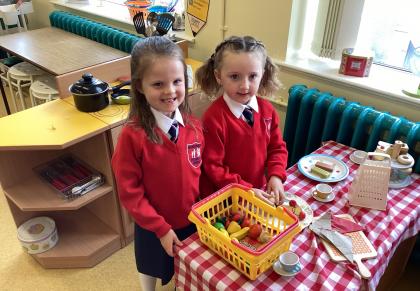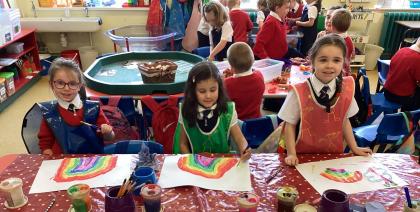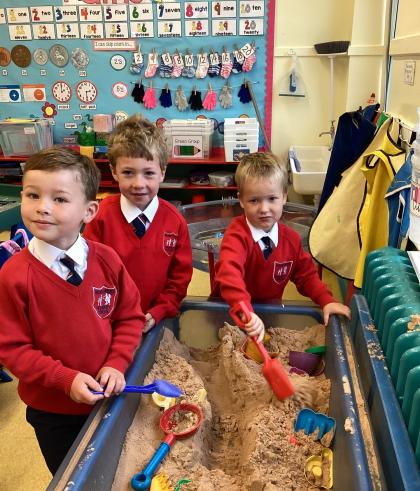Tel: 028 8674 8362
About Moneymore PS
ETHOS
Moneymore Primary School & Nursery Unit operates under the ethos of the Christian faith and is open to children of all faiths and none. The school and nursery unit seeks to provide high quality education for children to enable them to learn, develop and grow together, within the ethos of non-denominational Christian values and principles. As a controlled primary school and nursery unit we welcome all young people, whoever they are and from wherever they come.
VISION & VALUES
'Striving for Excellence … Caring for Children'
In Moneymore Primary School we value:
HONESTY
We will develop an atmosphere of trust, openness and fair play.
RESPECT
We will value the potential and contributions of every individual.
HAPPINESS
We will create a welcoming, caring, happy and secure school.
TOLERANCE
We will treat everybody fairly, with consideration.
LOVE OF LEARNING
We will encourage curiosity, creative thinking and a positive learning environment.
COMMUNITY
We will build on and develop our links with parents and the local community.

LOCATION & PREMISES
Moneymore Primary School & Nursery Unit occupies a large and spacious site in the heart of Moneymore village. The existing school replaced a number of smaller schools and opened in 1962.
There are eight main classrooms, a central library area, a multi-purpose assembly/P.E. hall and two resource areas which allow staff to work with classes and smaller groups. Interactive whiteboards are installed in all classrooms.
We have over 60 i-pads in school that pupils in each class make use of. There are two carefully designed safe play areas and a grass sports pitch.
At present the school has eight full-time teachers. There is a full-time teacher in the Nursery unit. Several experienced classroom assistants support the children in their learning.
Our experienced and committed staff work enthusiastically to ensure the full participation of all pupils in the wide range of learning opportunities provided. The curriculum is enhanced through a range of educational visits and supported with the use of a wide range of ICT resources.

AREAS OF STUDY
The Principal and Staff work closely to organise teaching programmes in the various areas of study of the statutory N.I. Curriculum. These are
Language & Literacy
Mathematics & Numeracy
The Arts
The World Around Us
Personal Development & Mutual Understanding
Physical Education
The school has a Christian ethos and Religious Education is therefore taught in each year group.
CURRICULUM & ASSESSMENT
The school aims to provide a broad, balanced curriculum in line with recent educational reforms and has a high reputation for sound teaching. It is our policy to provide adequate opportunities for our children to:
• Communicate clearly and confidently
• Read fluently, accurately and with understanding
• Acquire basic mathematical understanding of appropriate mathematical concepts
• Acquire some knowledge and understanding of the world in which we live
• Develop qualities of mind, body, spirit, feeling and imagination.
The N.I. Curriculum is taught in three stages: children in Years 1 & 2 Foundation Stage; Years 3 & 4 are in Key Stage One whilst those in Years 5, 6 and 7 are in Key Stage Two.
The assessment of pupils’ progress is made using continuous assessment by the class teacher, which includes weekly, topic and termly/yearly tests and the results of external and standardised tests.
The School Day

Afternoon Timetable
Primary 1, 2 and 3 children go home every afternoon at 2pm.
Primary 4, 5, 6 & 7 finish every afternoon at 3pm (2pm Friday's).
In order to ensure the children have access to a broad and balanced curriculum, we have planned the afternoon period from 2.10 - 3.00pm with emphasis on the Creative and Expressive Studies, namely:
Music
Art and Design
Religious Education
Physical Education
Activity Based Learning

STAFF
TEACHING STAFF
NON-TEACHING STAFF
BOARD OF GOVERNERS
The governors of Moneymore Primary School are ultimately responsible for the overall management of the school. In accordance with the Scheme of Management for Controlled Schools, some of their duties include:
•The oversight of the curriculum.
•The control of the budget
•The provision of information to parents.
•The selection of staff.
•The maintenance of the premises. (Shared responsibility with EA-SR)
•The Admissions Policy.
•Fostering links with the local community.
